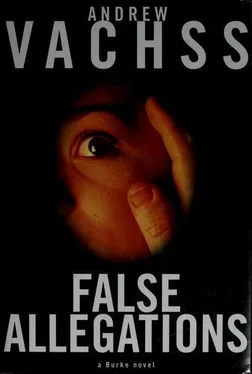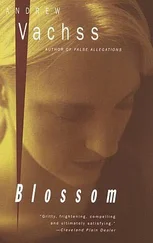"You know my place on Mott Street?" she asked, like she hadn't heard me.
"Sure," I told her. Behind an orange steel door, a series of immaculate rooms, all furnished in duplicates: twin chairs, twin lamps, twin ashtrays. Inlaid mosaic tile tables, teak floors, pristine white walls dotted with framed hand–drawn haiku and old tapestries. Recessed lighting. Heavy dark plum floor–to–ceiling curtains blocking all outside light. Central air–conditioning whispering within cork–lined walls, vacuuming humidity away. A marble slab covered with black velvet, twin stalks of fiber–optic adjustable lights for examining jewelry.
"Showroom," Mama said. "Understand?"
"To show the goods?" I answered tentatively, not sure where she was going. Mama dealt in product. Transportable product. Diamonds, bearer bonds, engraved currency plates. Guns were too bulky, narcotics too shaky–flaky. When I first met her, I realized we were in the same business. Only Mama stayed at the high end.
"Goods not change," she said. "Emerald on velvet is same as emerald on wood, yes? Mott Street not to show the gems, to show the dealer. Face. Very important. Serious business, take serious, okay?"
"You think this Kite guy, he went through all this just to show me he was a serious player?"
"Sure," Mama said, shrugging her shoulders to show it was no big deal. "Good investment, maybe."
"I'm small–time, Mama. Nobody needs all that to try and sell me a job."
"Must be big job," is all she said.
Calling Kite was a no–risk—if there was a way to kill someone over the phone, nobody'd work for the Motor Vehicle Bureau. And I always use the phone like it's a party line anyway—with the cops on the other end. But the way this was coming down, even all that didn't make me feel safe enough.
So, just before daybreak, I drove up to Hunts Point. The City's supposedly been fixing the FDR for years, but under its lousy overhead lighting, it was even more of a killing ground for cars than usual—busted chunks of pavement cleverly camouflaged the cavernous potholes, broken glass glittered everywhere. Buying a new car in this cesspool of a city is like wearing a tuxedo to a gang fight.
The streets were still slick from a midnight rain, so I picked my way carefully over the Triborough. Rolling north on the Bruckner, I drove by an underpass and spotted a tow truck lurking, shielded from sight, its red taillights the glowing eyes of a carrion–eater, waiting for the next car to die.
I pushed the button for the all–news station. Big bulletin: Seventeen overdose deaths directly attributable to a new brand of heroin on the street called China Doll. That's the kind of crap they call a "public service announcement." Sure. Truth is, they're not scaring the junkies off with that kind of crap—they're running a promotion for the new stuff. Every dope fiend in town is going to want a piece of that fresh dynamite; if it's killing people, it's the real thing, not some cut–sugar lemonade.
The radio said the year–end survey showed subway crime was down. In all areas except homicide—the only crime that self–reports. I wonder why they call it "news."
There's an all–sports station too. They had an interview with the guy who owns the Yankees, Steinbrenner. He was saying how nobody wants to go to the Bronx to see the Yankees because the neighborhood around the stadium is too dangerous. Not suitable for families. Except for the ones who live there, I guess. Steinbrenner charges a hundred bucks for a pair of tickets and a couple of beers and he says the reason the attendance is so lousy is because of crime. Maybe he means highway robbery.
The rest of the AM dial was all halfass advice: money, love, real estate, food. And the usual hate talk. New York's all black and white now, a sharp blood–red line between the colors. The black radio stations still don't get it—when O.J. Simpson was acquitted, every Klansman in America cheered.
I switched over to FM, looking for some music, but BGO was playing jazz, not blues. And the CBS oldies station was playing disco.
I went back to the news: Some freak took real good care of his girlfriend. Paid for everything, including her implants. When she said she was leaving, he tried to repossess them. With a knife.
A drunk driver's car hit a child so hard they found his license plate inside the kid when they did the autopsy. Happened in Queens—the driver'll probably get probation. Doesn't matter—last guy to run for D.A. there did it on the Democratic, Republican, Liberal, and Conservative tickets. Even if sheep could talk, they'd never ask questions.
An idiot in an iridescent yellow Honda Accord sedan flew past me on the right, huge tires set so far outside the fender line they looked like pontoons. That's what the tires were about—looks. The car wouldn't handle worth a damn. Lot of guys make that mistake, and not just with cars.
Inosed the Plymouth against the razor–wire–interwoven chain–link fence and waited. The junkyard was quiet, like it always is. It's always alive too. The dog pack ambled up to the fence, only mildly interested but on full alert. Then Simba chested his way through the pack. A German shepherd's face on a bullmastiff's body, his single–coated fur a dull gold color, his ears too big for his head. He looked misbegotten, but his carriage was a king's. Not a bloodline king, a warrior king who had taken his throne by combat. He was old now. Slower, maybe, but stronger than ever, case–hardened from years of successful survival. Darwin's Dog. A white pit bull female with a black patch over one eye strode next to him, a step back and to the side. Not deferring, guarding the flank. A harlequin Dane watched from the left, standing alone. To the right, a half dozen of that special breed of lean, dirt–colored, slash–and–burn brothers to wolves and coyotes—the American Junkyard Dog.
Terry walked through the pack, good–naturedly bumping dogs out of his way with a knee when they blocked his progress. "It's Burke, Simba!" he called out to the boss dog, as he unlatched the gate so I could pull the Plymouth inside.
If Simba was impressed with the news of my arrival, he managed to keep it concealed, pinning me with his alligator eyes as I climbed out of the car, his posture telling the pack to hold its ground. I stood there while Terry moved the Plymouth between some junked cars. It merged with the other wrecks, looked right at home.
We walked all the way back to the clearing next to the Mole's bunker. "He's gone out," Terry said, answering my question before I asked.
I raised my eyebrows—the Mole left the junkyard about every three, four years.
"With Mom," he said. Meaning Michelle. She'd taken Terry out of a kiddie–sex freak show years ago. Adopted him by force. I was the force, Michelle was the love. She'd never said anything about wanting a kid all the years I knew her, but she took one look at Terry and gave birth.
He was a little one then, performing on command. Sold by his bio–parents, pimped by a smooth–talking psychopath right out on the Deuce. A fast–food service: fresh hot chicken to go, rentals only. I didn't know how old he was, not for sure. Birth certificates aren't required in our family. He looked about sixteen now. A slim, handsome teenager. He'd be taller than me when he got his full growth. That was the only genetics in him. The Mole taught him science, Michelle taught him art. With those two in him, it was a sure bet the kid would break atoms and break hearts. Someday, he'll walk around the finest college campus, and he'll have lots of friends. He'll look just like them too. Except for his eyes.
Michelle was done with her journey. It wouldn't be long before Terry started his. If that bothered the Mole, he kept it to himself. But Michelle was digging her talons in as deep as any mom who raised him from the cradle, knowing it was coming, holding tight against it anyway.
Читать дальше











